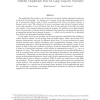Free Online Productivity Tools
i2Speak
i2Symbol
i2OCR
iTex2Img
iWeb2Print
iWeb2Shot
i2Type
iPdf2Split
iPdf2Merge
i2Bopomofo
i2Arabic
i2Style
i2Image
i2PDF
iLatex2Rtf
Sci2ools
117
click to vote
CORR
2008
Springer
2008
Springer
Truthful Unsplittable Flow for Large Capacity Networks
The unsplittable flow problem is one of the most extensively studied optimization problems in the field of networking. An instance of it consists of an edge capacitated graph and a set of connection requests, each of which is associated with source and target vertices, a demand, and a value. The objective is to route a maximum value subset of requests subject to the edge capacities. It is a well known fact that as the capacities of the edges are larger with respect to the maximal demand among the requests, the problem can be approximated better. In particular, it is known that for sufficiently large capacities, the integrality gap of the corresponding integer linear program becomes 1 + , which can be matched by an algorithm that utilizes the randomized rounding technique. In this paper, we focus our attention on the large capacities unsplittable flow problem in a game theoretic setting. In this setting, there are selfish agents, which control some of the requests characteristics, and ...
Related Content
| Added | 09 Dec 2010 |
| Updated | 09 Dec 2010 |
| Type | Journal |
| Year | 2008 |
| Where | CORR |
| Authors | Yossi Azar, Iftah Gamzu, Shai Gutner |
Comments (0)

